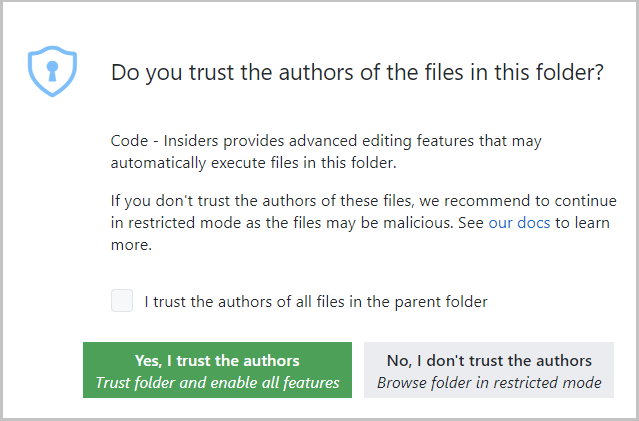Note: This extension is no longer being maintained and has been removed from the Visual Studio Code Marketplace. You can still install the extension directly from the VSIX file if you'd like to use it. To install the extension from the VSIX file, follow the instructions below or see this link for more information.
- Download the VSIX file and open Visual Studio Code
- Press
Ctrl+Shift+PorCmd+Shift+Pto open the command palette- Type
Install from VSIXand pressEnter- Select the VSIX file you downloaded
Azure Cognitive Search is a search-as-a-service cloud solution that gives developers APIs and tools for adding a rich search experience over private, heterogeneous content in web, mobile, and enterprise applications.
This Visual Studio Code extension makes it easy to manage your search service with the full capabilities of the REST APIs while providing rich IntelliSense and snippets to make it easier to take advantage of the full range of capabilities. With the extension, you can create and update indexes and other components, add documents, search, and more. Check out the gifs and images below to see the extension in action.
Get access to all your search services in one place. You can quickly see all your indexes, indexers, and other components.
You can create a new index or other component just by editing the JSON and saving the file. You can then read, update, or delete these components at any time.
The extension also includes IntelliSense to guide you as you’re building out your JSON. Instead of referencing external docs each time, you can see what parameters exist and what their allowed values are as you type.
In addition to IntelliSense, the extension provides snippets or templates for building more complex objects, such as data sources and skillsets, so that you have a good starting point.
Adding or updating documents is something that’s not possible in the portal today. With the extension, you can quickly add a document, and it will even save you some time by creating a JSON template for you based on your index definition.
You can view or update existing documents too.
Once you’ve added documents to your search service, you can also query from within the extension and view the results side by side. You can even add multiple queries or save the queries to a file to refer to them later.
-
Install the extension from the VSIX file.
- Download the VSIX file and open Visual Studio Code
- Press
Ctrl+Shift+PorCmd+Shift+Pto open the command palette - Type
Install from VSIXand pressEnter - Select the VSIX file you downloaded
-
On View > Command palette, scroll or type Azure: Sign in.
-
After signing in, select the Azure button on the bottom left. You should get the list of installed Azure extensions on the right in extension explorer.
-
Expand Cognitive Search, your subscription, and your search service to access content. You need Contribute permissions or above to access the content.
To filter the subscriptions that show up in the extension's explorer, select Select Subscriptions... button on any subscription node (indicated by a filter icon when you hover over it), or select View > Command palette and search for Azure: Select Subscriptions. Note that the filter will apply to all VS Code extensions that support the Azure Account and Sign-In extension.
If you don't have an Azure Account, you can sign up for one today for free and receive $200 in credits by selecting Create a Free Azure Account..." or selecting View > Command palette and searching for Azure: Create an Account.
To sign out, search for Azure: Sign out in View > Command palette.
There are several ways you can contribute to our repo:
- Ideas, feature requests and bugs: We are open to all ideas and we want to get rid of bugs! Use the Issues section to report a new issue, provide your ideas or contribute to existing threads.
- Documentation: Found a typo or strangely worded sentences? Submit a PR!
- Code: Contribute bug fixes, features or design changes:
- Clone the repository locally and open in VS Code.
- Open the terminal (press
CTRL+`) and runnpm install. - To build, press
F1and type inTasks: Run Build Task. - Debug: press
F5to start debugging the extension.
Before we can accept your pull request, you will need to sign a Contribution License Agreement. All you need to do is to submit a pull request, then the PR will get appropriately labelled (e.g. cla-required, cla-norequired, cla-signed, cla-already-signed). If you already signed the agreement, we will proceed with the PR, otherwise the system will tell you how you can sign the CLA. Once you sign the CLA, all future PR's will be labeled as cla-signed.
This project has adopted the Microsoft Open Source Code of Conduct. For more information see the Code of Conduct FAQ or contact [email protected] with any additional questions or comments.
VS Code collects usage data and sends it to Microsoft to help improve our products and services. Read our privacy statement to learn more. If you don't wish to send usage data to Microsoft, you can set the telemetry.enableTelemetry setting to false. Learn more in our FAQ.








